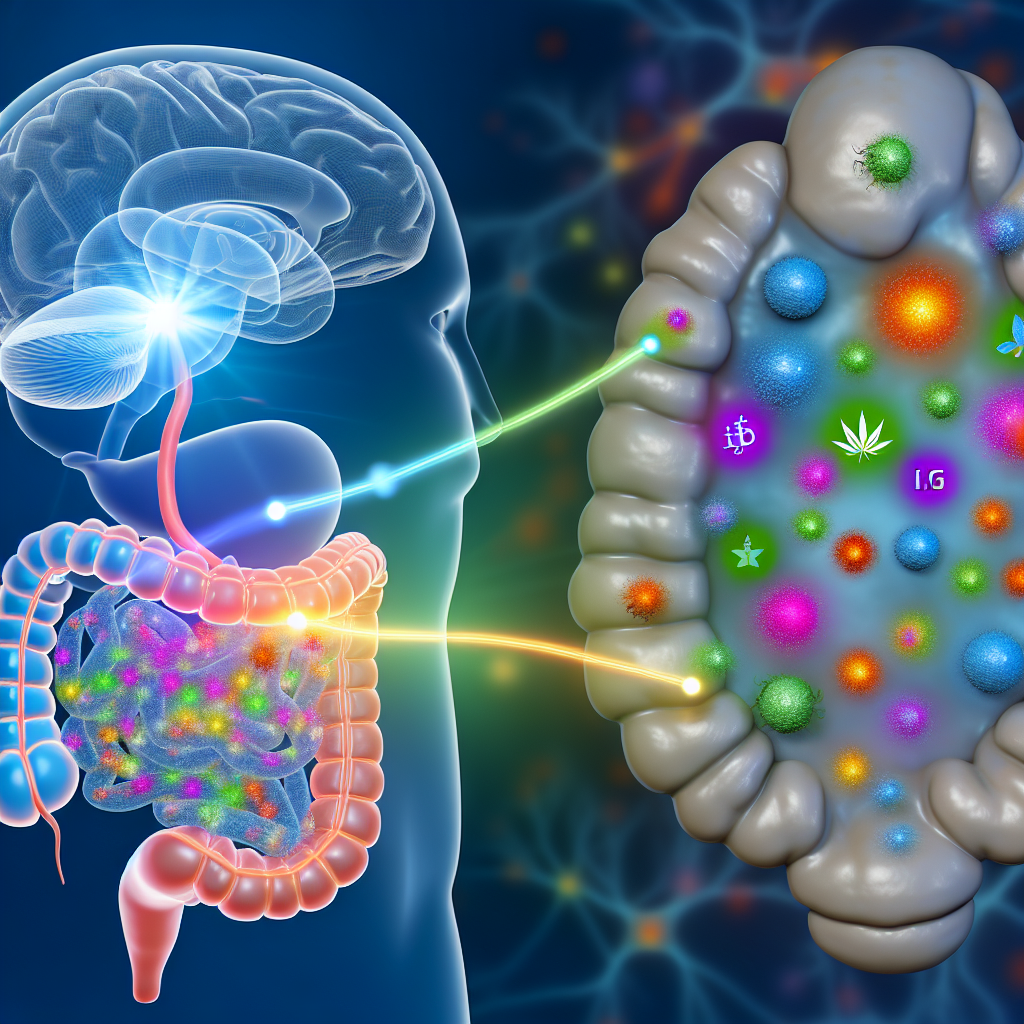The Gut-Brain Axis – How Cannabinoids Modulate the Microbiome for IBD and IBS
Introduction
The term “gut feeling” isn’t just an expression—it’s rooted in the deep physiological communication between the gut and the brain, called the gut-brain axis. This bidirectional communication system integrates the central nervous system (CNS), enteric nervous system (ENS), and the gut microbiota. It plays a vital role in gastrointestinal functioning and emotional well-being.
Disruptions in this axis have been associated with disorders such as inflammatory bowel disease (IBD) and irritable bowel syndrome (IBS). While IBD includes structural inflammation (e.g. Crohn’s disease, ulcerative colitis), IBS is a functional gastrointestinal disorder with overlapping symptoms such as abdominal pain, diarrhea, bloating, and bowel habit irregularities.
Further complicating these conditions, research points to gut microbiome imbalance (dysbiosis) as a key driver of both disorders. Additionally, mood disorders like anxiety and depression are commonly seen in IBS and IBD populations, suggesting that brain-gut communication is impaired.
Cannabinoids—chemical compounds such as THC (tetrahydrocannabinol) and CBD (cannabidiol)—interact with the endocannabinoid system (ECS), a crucial regulator of gastrointestinal health. The ECS includes receptors such as CB1 and CB2, which influence gut motility, intestinal permeability, and immune response.
Recent discoveries indicate that cannabinoids can alter the gut microbiota directly and indirectly, potentially restoring microbial diversity and reducing intestinal inflammation. Their anti-inflammatory, analgesic, and neuroregulatory benefits promote promising avenues for managing chronic gut disorders such as IBD and IBS.
This article explores how cannabinoids interact with the gut-brain axis and the gut microbiota, providing new perspectives for treating complex gastrointestinal disorders.
Features and Medical Studies
The growing body of research exploring cannabinoids for gut health is expanding rapidly, with new clinical and preclinical studies shedding light on their mechanisms.
A 2019 review in Frontiers in Neuroscience emphasizes the significance of the endocannabinoid system in regulating intestinal homeostasis, highlighting the widespread presence of CB1 and CB2 receptors in the gut. These receptors influence vital functions, including gut motility, epithelial barrier integrity, and mucosal immunity. Such features are crucial in maintaining a healthy gut environment and protecting against inflammatory conditions.
(Source: Frontiers in Neuroscience)
In a 2020 study published in Cell, cannabis’s role as a modulator of gut microbes was examined. Researchers found that elevated endocannabinoid levels helped regulate the microbial ecosystem and fight bowel inflammation, offering a novel therapeutic pathway. It further suggested that phytocannabinoids like CBD could be leveraged to affect bacterial populations favorably.
(Source: Cell Journal)
Another essential study, published in 2021 in Clinical Gastroenterology and Hepatology, analyzed the therapeutic effects of THC-dominant cannabis in patients with Crohn’s disease. Participants using THC-rich cannabis reported improvements in appetite, quality of life, and sleep, although levels of inflammatory biomarkers like CRP and calprotectin remained unchanged. This suggests cannabinoids play a symptomatic and quality-of-life role, likely via interaction with the ECS and downstream microbial modulation.
(Source: Clinical Gastroenterology and Hepatology)
In related animal studies, a 2021 study in Frontiers in Pharmacology focused on CBD’s interactions with gut microbes in mice suffering from chemically induced colitis. Results showed that CBD not only reduced inflammation but also restored species variety within the gut microbiota. The study posited that the anti-inflammatory effects were mediated through multiple mechanisms, including cytokine regulation and microbial shifts.
(Source: Frontiers in Pharmacology)
For IBS, where stress, anxiety, and pain perception significantly impact symptom severity, cannabinoids offer neuropsychological modulation. THC and CBD have shown anxiolytic and antiemetic properties, which may regulate pathways such as the vagus nerve and serotonin. Because IBS involves both gut dysfunction and brain signaling disruption, cannabinoids’ dual action on the microbiome and CNS makes them highly relevant as part of integrative care.
Conclusion
The importance of the gut-brain axis in managing chronic gastrointestinal conditions continues to grow. As we understand more about its role in diseases like IBD and IBS, cannabinoids emerge as promising therapeutic tools. Their ability to alter inflammatory states, optimize microbiota balance, and influence brain-gut communication positions them at the forefront of future treatment strategies.
Moving forward, more clinical trials and microbiome analyses will be key to unlock the full potential of cannabinoids in personalized GI medicine. The focus on the microbiome, ECS, and neurological modulation represents a shift toward holistic, integrative approaches in the treatment of chronic bowel diseases.
References
1. Frontiers in Neuroscience – The ECS as a Regulator of Gut Health
2. Cell Journal – ECS and Microbiome Modulation
3. Clinical Gastroenterology and Hepatology – THC-Rich Cannabis in Crohn’s Disease
4. Frontiers in Pharmacology – CBD’s Effects on Gut Microbiota
5. National Institutes of Health – The Microbiome and Gut-Brain Axis (Overview)
Concise Summary
The gut-brain axis is essential in regulating gastrointestinal and mental health, with disruptions linked to disorders like IBS and IBD. New studies show that cannabinoids like THC and CBD modulate this axis effectively by influencing both the endocannabinoid system and gut microbiota. Cannabinoids demonstrate anti-inflammatory, anxiolytic, and microbiome-balancing effects, offering promising therapeutic pathways. Research reveals that cannabis compounds affect gut receptors and microbial populations, improving symptom management and gut health. This integrative approach positions cannabinoids as potential agents in the development of personalized gastrointestinal care.




